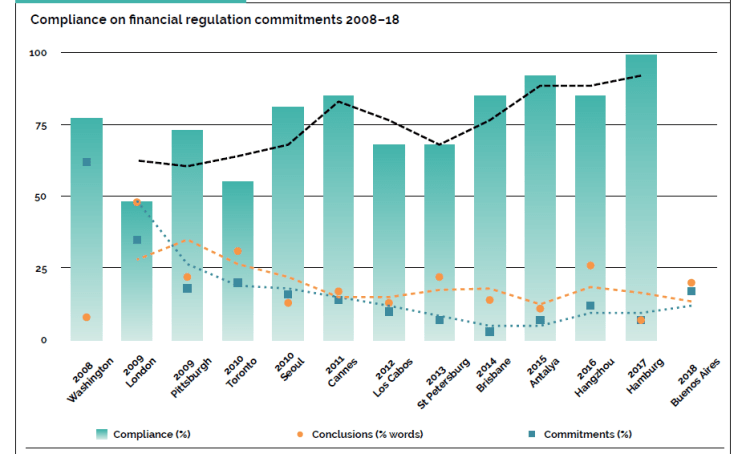Challenge
Proposal
More than a decade after the 2008 global financial crisis that gave rise to G20 summitry, financial regulation remains one of the central issues on the G20 agenda. Although its share of G20 commitments has declined, the importance of cooperation on financial stability and transparency should not be underestimated. Japan’s presidency will continue working to strengthen the international financial system. G20 leaders at the Osaka Summit will pursue the goals of eliminating financial market fragmentation and achieving fair corporate taxation. Financial innovation, notably blockchain technology, presents new challenges that require an appropriate regulatory response.
Conclusions
Financial stability has been at the core of the G20 agenda since its start. The first G20 summit, at Washington in 2008, was motivated by the desire to find a coordinated multilateral solution to the global financial crisis. The G20 leaders there dedicated 2,877 words to financial regulation. Since then, the average number of words related to financial regulation in the conclusions issued in the leaders’ communiqués at each summit has been 2,702 (8%). The number rose to 6,448 words (22%) at the St Petersburg Summit in 2013. At Buenos Aires in 2018, the G20 referred to financial regulation with 1,694 words (20%). The high was 48% at the London Summit in 2009.
Commitments
Since 2008, G20 leaders have made 340 commitments on financial regulation. These represent 13% of the total 2,526 commitments. In 2008, the Washington Summit made 59 (62%) commitments on financial regulation, as it was an urgent priority to address the financial crisis. The percentage on financial regulation then steadily decreased as the urgency of the subject waned and as more issues were added to the agenda of summits. Recently, however, there has been a moderate increase in the number and share of commitments. This possibly reflects a response to potential threats to the security and stability of the international financial system from new technological challenges.
Compliance
Of the 340 commitments on financial regulation, the G20 Research Group has assessed 27 for members’ compliance. Compliance averaged 80% overall, well above the 71% average across all subjects. The lowest compliance on financial regulation came from London in 2009 at 48%. The highest came from Hamburg in 2017 at 99%. Overall, there is a rising trend. Canada, France and the European Union were the top compliers, averaging 94% each.
Several accountability measures appear to lead to strong compliance with financial regulation commitments. First, a greater number of commitments on a subject at a summit correlates with enhanced compliance with them. Several specific catalysts, or embedded text that provides direction on implementation, tend to boost compliance.
On financial regulation, the two commitments referring to international law had compliance of 86%, compared with 79% for those without this catalyst. A reference to a past summit also tended to result in improved compliance, with one such commitment with 85%. The commitment that referred to G20 finance ministers had 100% compliance. Although causes of compliance are complex and may include many international political and economic factors, accountability measures are under the direct control of the G20 leaders and are relatively inexpensive.

Corrections
G20 performance on financial regulation has seen several dips. New challenges constantly arise. Rapid technological improvements may lead to financial instability. Thus, a coordinated and comprehensive regulatory framework is necessary to ensure financial stability. To ensure higher compliance with commitments on financial regulation, G20 leaders should produce more such commitments at each summit, and include in them direct references to G20 finance ministers, past summits and international law.
The views and opinions expressed in this article are those of the authors and do not necessarily reflect the views of the Global Solutions Initiative. This article was originally published in G20 Japan: The 2019 Osaka Summit by GT Media Group and the G20 Research Group, 2019. View the original article.








